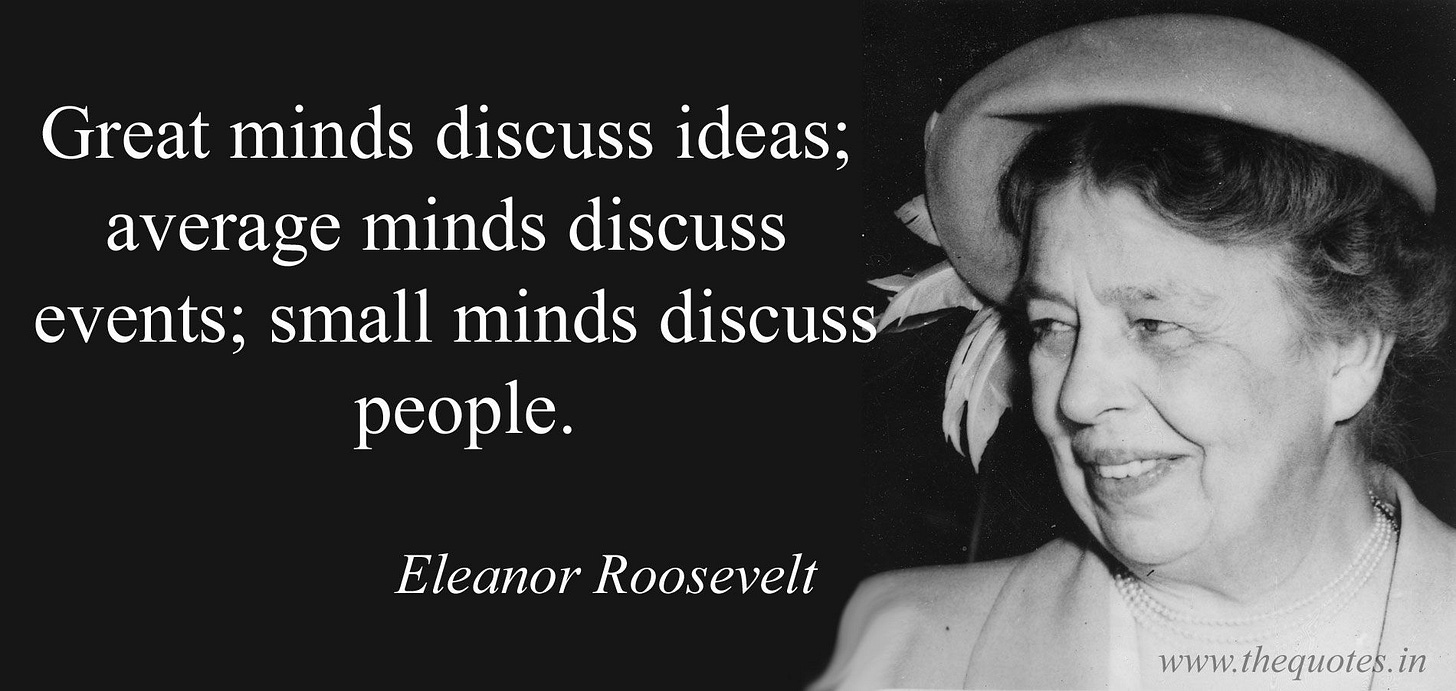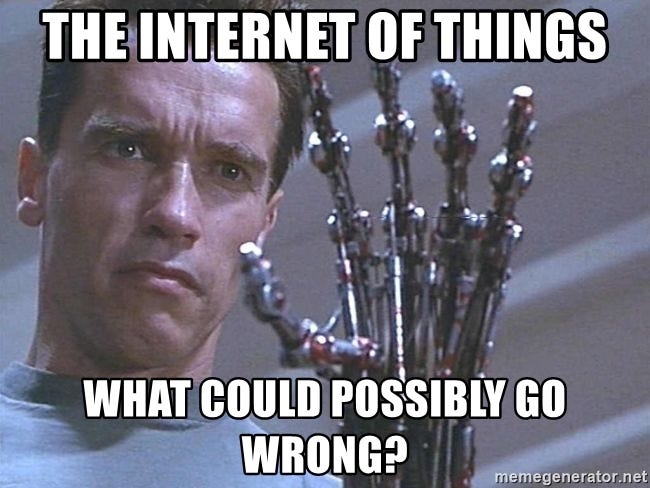There Be Dragons! (2)
The ideas from fiction, even the most fantastical, are valuable because the ideas which animate them are real. (Part 2 of 2)
(Continued from Part I)
Eleanor Roosevelt’s (or whoever it came from) quote above should animate how we approach any number of endeavors involving knowledge… from literature, to news, to education.
It’s almost self-evident that discussion about ideas are of the highest value, above those of events or worst of all… people. (If you think about it, this is why tabloid, “click-bait” — the lowest form of information out there — news outlets are almost completely about people — “celebrities” if you will. This is why the Royal Family (with the possible exception of the Queen herself) in the United Kingdom has become so blasé. There is no real reverence or solemn deference for the crown anymore. No genuflecting to the “sovereign.” They’re just… really rich and famous. Important… but mostly rich and famous. This is, by the way, why I would hardly ever pick up a “People” magazine. It’s hard to get worked up about famous people … especially simply because they’re famous. But they’re “real” people…. right? (By the way, when the U.S. media starts describing its famous people as “American Royalty”… then that should tell you something.)
“Normal” news, or “straight” news (basically the relaying of the most recent possible events) is right behind the tabloids in uselessness; this is most especially true, of course, when the news is focused on the foibles of certain people, including the ones delivering the news, but even in its purest form of relaying factual information… it can still be wrong, inaccurate, slanted, and even selective to the point of deceiving.
In other words, people and events… even real, verified, true ones… even the ones we know are good don’t always have good things to tell us strictly by being real. Their choices, though, and their words, and their character and actions can tell us a great deal, which means that this is what we’re learning from, and fictional characters, written well, can perform the same service… sometimes even better than the real thing.
God is everywhere
So what about the spiritual objection — the belief that fantasy and science fiction are possibly even demonic or anti-biblical? After all, the characters aren’t even always human. They could be aliens or dwarves. How can you dig into the cosmology, anthropology, or ecclesiology of your faith when you’re having to contend with stories of creatures that don’t exist, from planets or realms with no “fall” and varying characters with impossible, sometimes God-like powers over nature? How do you ignore the connection of these things to witchcraft and the possibility of the occult creeping in.
First off, it’s important to know that some fantasy is indeed bordering on the occult and some fantasy stories can look and feel and convey demonic ideas. (If you believe that is truly at work in the world, then this is…known.) But of course not all fantasy and sci-fi is demonic or cultish. The two Godfathers of all modern (20th Century) fantasy were VERY devout Christians, one Roman Catholic and one High Church Anglican. The latter, C. S. Lewis even wrote probably the most profoundly beautiful science fiction stories ever written. They both wrote extensively on how their stories conveyed Christian ideas. The Narnia novels were almost explicitly allegorical, while J.R.R. Tolkien was adamant about the stories of Middle Earth being not so. The depth of Tolkien’s legendarium, though, and the elegance of Lewis’s Narnia are objectively truthful and undeniably beautiful. The ideas they convey.. the truths about humanity (Hobbits and Fauns are people, too) are relevant to us no matter how confident we think we are about their not being “real.” Legends are legends. Whether it’s a fictionalized character of someone we know, or a true-to-life character of someone we’re sure never existed, doesn’t really matter.
To take this a slightly different direction, let’s ask this:
How do angels work?
Do they have souls? Do they live forever? Can they feel pain? Are they aware of God’s plan inherently or do they have a meeting every morning (or millennium or so) and take notes?
Angels are an important group of characters in The western scripture… in the universe as we see it through the Torah/Bible. If you are a Jew or a Christian, then you must believe that angels and demons exist… I mean I hope so, or we might end up giving someone credit for… the greatest trick.
So if angels do exist, then we really don’t understand them well. There is not a lot that I know about a lot of things. But there’s one thing that I’m almost positive about: that all the renditions of angels in modern entertainment — even those expressly and honestly created for the purpose of conveying Christian ideals and values — are wrong. From Touched by and Angel to It’s a Wonderful Life, to Lucifer to Angels in the Outfield, A Life Less Ordinary (one of my favorites)… all of them are wrong. If there is any accuracy in them, it’s almost completely by accident. The Good Place has to be one of the least Christian-oriented television shows involving angels… maybe ever. Neither God (nor Jesus of course) is even mentioned in the show that I recall…. but it still seems that it probably has more going for it as a show in terms of teaching us to think about what it means to be good, than even “It’s a Wonderful Life”… a favorite angel movie of Christians and non-Christians alike.
Angel shows are often entertaining, occasionally enlightening, and yet the cosmology of all them is most likely all wrong. Elves, on the other hand? We know a lot more about elves. They are essentially the angels of Middle Earth and their understanding of men and man’s understanding of them in Tolkien’s legendarium speaks volumes about what it means to be human.
Hobbits and Fauns are People
Quickly on the topic of science fiction, specifically — though the line between sci-fi and fantasy can sometimes get a little blurry. On the nature of archetypes, there are a ton of similarities, especially in modern cinema renditions, between Vulcans and Elves (no, not just the ears), even though in the Tolkien books the elves are QUITE different than Vulcans. The similarity is mostly in their demeanor: serene, thoughtful, long-lived… and arrogant. These are virtues — and their often accompanying — vices we can stand to think about a little more anyway.
The other, perhaps more important facet of science fiction that is of value is how humans interact with technology. Most futuristic dystopian fantasies were considered science fiction in their day and were remarkably prescient, not just about specific technologies but our failures in using them justly and wisely.
I’ve predicted that the current generation still being born… roughly from 2010 to 2025 will be called “Generation R” — with “R” standing for “robot.” (Actually just make that official. You learned it here first.) When this starts to become more stark (it’s already happening) we will likely be thankful for the half dozen or so Robot Novels from Isaac Asimov and the stark warnings from Phillip K Dick and others. Even Terminator is educational; how much control can/should we give computers?
More importantly than how we interact with technology are the more important questions of: what it means to be a human being? How important is it to our humanity that we are born, live, and die? Bicentennial Man has an answer worth exploring. How really did we come into existence and what would it mean if it happened in a way very different than we thought? Does it matter? How do we treat these who are fundamentally different than us in every way imaginable, including and not limited to: how we interact, including and not limited to: how we interact with gravity (The Expanse). How we build our homes (Hobbits) whether we have souls which will escape this Earth our death (Elves and Men), whether we speak through verbal or visual communication at all (to say nothing of a different language).
This doesn’t mean that “real” literature is less valuable. We have a lot to learn from it. But it’s my opinion that the real hard stuff that will prepare us for the next millennium in the most robust ways possible will be high-quality, speculative (yes, speculative and fantastical) fiction.
All the stories come from humans, which means all the creatures in all the stories come from humans, thus they have human qualities, virtues, foibles, ideas that we need to contend with. As many tools as we can have in our tool chest to learn those things, the better off we are. We need every available mechanism we can muster to teach our kids and ourselves virtues of courage, kindness, perseverance, humility … love … all of them.
We’ll end with another quote from Chesterton (can’t seem to get away from him):
“Fairy tales do not tell children that dragons exist. Children already know that dragons exist. Fairy tales tell children that dragons can be killed.”







That last (paraphrased) Chesterton quote is one of my favorites. The whole passage from The Red Angel in his Tremendous Trifles collection is fantastic...and so very true. And I love this post!